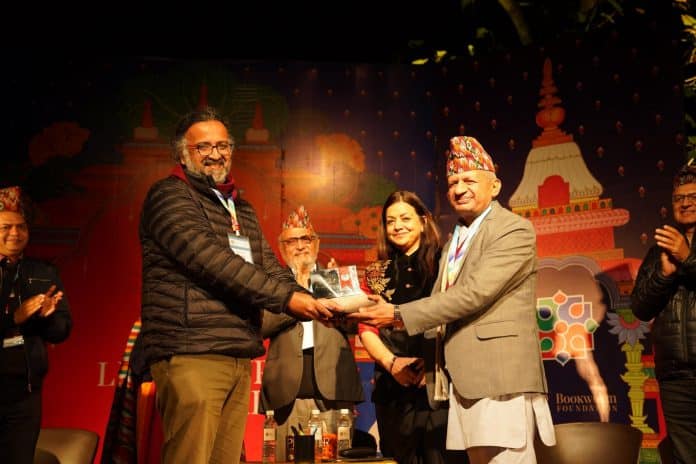
Amitabha Bagchi ‘s brilliant novel “Half The Night Is Gone” was declared the winner of the $25,000 DSC Prize for South Asian Literature 2019 being cited for a novel in English that feels like a book written in an Indian Language which has lost nothing in the translation and beating off a stiff challenge from five other contenders in the shortlist.
He received the award from Nepalese Foreign Minister Pradeep Gyawali and DSC Prize co-founder Surina Narula after his name had been declared by jury chair Harish Trivedi on the concluding day of the IME Nepal Literature Festival.
Apart from Bagchi, whose novel has been published by (Juggernaut Books, India), the others in the shortlist were Jamil Jan Kocha for “99 Nights in Logar” (Bloomsbury Circus, Bloomsbury, India & UK, and Viking, Penguin Random House, USA), Madhuri Vijay for “The Far Field” (Grove Press, Grove Atlantic, USA), Manoranjan Byapari for “There’s Gunpowder in the Air” (Translated from Bengali by Arunava Sinha, Eka, Amazon Westland, India), Raj Kamal Jha for “The City and the Sea” (Hamish Hamilton, Penguin Random House, India), and Sadia Abbas for “The Empty Room” (Zubaan Publishers, India).
“This novel, written in English, feels like a book written in an Indian language, and has the authenticity and the interiority of a work in translation without in fact being a translation,” the citation said.
All sub-continental novelists in English since Raja Rao have striven “to express in a language that is not one’s own a sensibility that is one’s own”. This novel “evokes the sensibility of not one but three Indian languages: Hindi, Urdu and Sanskrit. It weaves together three parallel stories, interrogating the relationships between men and women, fathers and sons, masters and servants, and the nation and the individual. It is epic in scope, profound in its exploration of class and gender, and elegantly assured in the way it infuses English with Indian wit and wisdom to achieve an unprecedented commingling of different literatures and cultures,” the citation added.
“In all humility, I am very happy to be in the company of such writers (on the shortlist),” Bagchi said in his acceptance speech adding: “I hope to represent all of them. I thank those (writers) who have come before us; who have contributed to our literature and poetry. In troubled times, poetry tends to get sucked out. Our attempt is to give this back to society.”
“South Asia is now, perhaps, more visible and more omnipresent than ever before. There is a South Asia at home and a South Asia abroad and both inhabit a shared literary space of writings originally in English or translated into English,” Trivedi, a former Professor of English at Delhi University who has written extensively on colonial and post-colonial literature, said on the occasion.
The DSC Prize, he said, is the only one that encompasses nine different countries in South Asia and the diaspora, and this year we also received entries from some writers with no ethnic connection with South Asia. For the five jury members located in five different countries, reading 90 novels in 90 days was a transformative experience.
“Over the months, we arrived at a diverse and inclusive longlist of 15 and a shortlist of 6 novels, representing the polyphonic richness of the region. It is out of this collective literary churning that there has emerged a winner whose work subsumes many languages and sensibilities,” he added.
The others on the jury were Jeremy Tambling, former Professor of Literature at the University of Manchester with an interest in present and past literatures, in critical theory, and in film; Kunda Dixit, Editor of the Nepali Times newspaper in Kathmandu, and author of several books on the South Asian region, climate change and technology; Carmen Wickramagamage, Professor of English at the University of Peradeniya, Sri Lanka, whose work has focused on feminism, postcolonial theory, and Third World women writers; andA Rifat Munim, a bilingual writer, essayist, and translator, and the literary editor of Dhaka Tribune in Bangladesh, with special interest in South Asian English writing.
Congratulating the winner Amitabha Bagchi, Surina Narula said: “My heartiest congratulations to Amitabha Bagchi for winning the DSC Prize for South Asian Literature 2019 for his brilliant novel ‘Half The Night Is Gone’. All the shortlisted books this year deal with diverse and powerful themes and there were three debut novels and a book about Afghanistan. It is a tough decision as always for the jury to choose a winner from these exceptional entries. We are delighted to be invited to give the award this year in Nepal and I hope this encourages more publishers from Nepal to enter their books for the prize next year. The DSC Prize has now completed nine years and it is heartening to see the increased interest amongst readers across the world in South Asian life and culture through these books.”
The five-member international jury and four of the shortlisted authors were present at the event where the authors did a reading from their novels.
Madhuri Vijay, who earlier this year won the Rs 25 lakh JCB Prize for Literature 2015, couldn’t make it as she has just delivered a baby girl, while Sadia Abbas was unwell.
The announcement was well received by the audience present at Festival, where the best of Nepali and South Asian literature was on view. This is in line with the prize’s vision to encourage literary talent in various South Asian countries which it has been doing by announcing the winner in Sri Lanka, Bangladesh, India and Nepal over the last four years.
IANS



